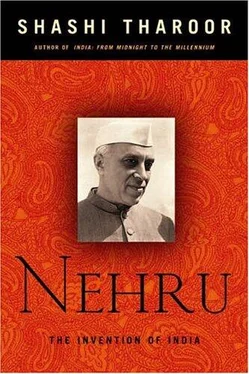194–95
marriage of, 127–29
Nehru’s writings to, 81–82
state of emergency called by,
231–32
as successor, 194–95
Gandhi, Mahatma
about, 255
assassination of, 160–61
Bose and, 114–15
demonstrations led by, 75–76
fasting by, 92, 127
imprisonment of, 77, 125, 127
influence of, on Indian
National Congress, xiv,
35–37, 67, 69–70
Jinnah and, 130
Khilafat movement and, 34–35
negotiations between British
and, 83–85
Nehru and
compromises between, 67,
93, 97
differences between, 43–44,
53, 59–62, 84–85, 92, 94
loyalty between, 29–30, 35–
39, 138
power relations between,
69–70, 99
noncooperation movement of,
27, 35, 41–42, 43, 46,
120–21
nonleadership by, 47
nonviolence principle and, 46
on partition of India, 154,
159–60
personal habits of, 28
reaction of, to Amritsar
Massacre, 33
reaction of, to British
proposals, 123, 124–25
religious views of, 92
role of, in Indian nationalist
politics, 26–30, 34–36,
59–62, 67, 72
in South Africa, 26–27
support for a free India by, 74–
76
Swarajists and, 49
as symbol, 96
on war issue, 116, 120–21
Gandhi, Rajiv Ratna (grandson),
129–30, 236
Gandhi-Irwin Pact, 83–85, 87
Ganga (river), 215–17
Germany, 116
Glimpses of World History
(Nehru), 81–82, 127
Goa, 206–7
Gokhale, Gopal Krishna, xiv, 12,
35, 255
Gopal, Sarvepalli, 11, 14, 45,
249
Government of India Act, 25n,
98–99, 102–3
Great Bengal Famine, 133
Great Indian Novel, The
(Tharoor), 227
Hangen, Welles, 195
Haroon, Sir Abdullah, 139
Harrow (school), 9–11
Hindu Code Bill, 171, 235
Hindu Mahasabha, xvi, 93, 105
Hindu-Muslim relations
See also Muslim League
after partition, 135, 143–45,
167–68
Pakistan and, 209
Panch Sheel and, 184
relations between India and,
55–56, 188, 189, 209–13
war between India and, 210–
13
Chou En-lai, 189, 209
Churchill, Winston Spencer,
9–10, 83, 97, 122, 124,
133, 134, 188
civil disobedience, 27, 35, 41–
43, 46, 120–21
Clément, Catherine, 201
Communal Award, 102
communism, 55–58, 68–69
Communists, 75, 173, 175
Congress Party. See Indian
National Congress
Congress Socialist Party, 94, 97
Constitution, 87–88, 168
Cousins, Norman, 161–62, 195–
96
Cripps, Sir Stafford, 123–24,
138, 254
Czechoslovakia, 113
Das, Chitta Ranjan, 48–49,
255
Delhi, 22
democracy. See Indian democracy
Dhebar, U. N., 179–80
Direct Action Day, 145–46, 147
Discovery of India, The (Nehru),
122, 127, 225–26, 231
Djilas, Milovan, 190
Dominion status, for India, 65–
66, 72, 123–24, 153
Dulles, John Foster, 183, 186
Dutt, Romesh Chunder, 15
dyarchy, 48
Dyer, R. E. H., 31–32, 33, 34
education, 8–11, 13–15,
17–18
Egypt, 189–190
Ehrenburg, Ilya, 223, 224
Eight-Day Interlude, The (Nehru),
78–79
Einstein, Albert, 56
elections
British-sponsored, 99–103
general, of 1952, 172–73
general, of 1957, 192
general, of 1962, 207
Indian National Congress in,
99–103, 134–35
of Jawaharlal Nehru, 50–52,
69–75, 97–98, 100, 138,
172–73, 192, 207
Erskine, Lord, 111
Europe
influence of, on Nehru’s
political outlook,
52–59
travels in, 112–14
Fabian Society, 13, 14, 240 family tree, Nehru, xix fascism, 97, 116, 117
Five-Year Plans, 176–78 foreign policy
of India under Nehru, 182–91,
207–13
Nehru’s interest in, 58–59,
112–14, 150–51
France, 206
Gandhi, Feroze, 127–29, 194,
205, 255
Gandhi, Indira Nehru (daughter)
about, 255
childhood of, 37, 54, 112
children of, 129–30, 198
Nehru’s identification with,
38–40, 100–101
wretched conditions of, 38–40
Indian National Army, 122–23,
136
Indian National Congress
about, xiii — xv
contesting of elections by, 99–
103, 134–35, 172–73
dominance of, 229–30
election of Jawaharlal Nehru
as president of, 69–75,
97–98, 100
evolution of, 11–12
Extremists vs. Moderates in,
12, 23
Gandhi’s influence on, xiv,
35–37, 67, 69–70
governance by, under British
rule, 111–12
Motilal Nehru’s involvement
in, 24, 33–35, 48–49, 65–
66
Muslim League and, 24, 34–
35, 46–47, 104–9, 114,
119–20, 130, 141, 143–
45, 147–48
negotiations between British
and, 87–88, 139–41,
143–44, 146–47, 153–55
Nehru Report of, 65–66
Quit India resolution of, 125–
26, 130
splits in, 48–49, 71, 114, 166–
67
Indian nationalism, 212–13,
215–17
Indian nationalist politics
See also Indian National
Congress
British response to, 25–26,
26n, 63–65, 72, 76–78,
82–84, 89, 121, 122–24
Gandhi’s role in, 26–30, 34–
36, 59–62, 67, 72
Nehru’s role in, 59–62, 73–75
partition of Bengal and, 11–12
Indian People’s Party (Bharatiya
Jana Sangh), xvi — xvii
Indian political movements,
xiii — xvii
See also Indian National
Congress
Industrial Policy Resolution,
176, 178
Industries Act of 1951, 177
Iqbal, Sir Mohamed, 256
Ireland, 12–13
Irwin, Lord, 72, 73, 83, 256
Jain, S. P., 203–4
Japan, 122–23, 124, 185
Jefferson, Thomas, 227
Jinnah, Mohammed Ali
See also Muslim League
about, 256
British and, 73, 130
creation of Pakistan and, 145,
145–46
demand for creation of
Pakistan by, 139, 148,
154
interim government and, 146
as leader of Muslims, 109, 152
Muslim League and, xv, 103–4,
104–9, 114
negotiations between Congress
Party and, 140–41
Nehru and, 104–5, 147–48
political views of, 24–25, 35–
36, 65–66
on war issue, 118–20
Jones, Sir William, 10
British attempts at undermining, 103–4
deterioration of, 47, 65–66,
71, 104–9, 114, 119–20
Indian National Congress and,
111–12
Nehru’s attempts to restore,
75, 106–9, 135, 167–68
Nehru and, 93
unity in, 34, 46–47, 80
Hindutva, xvi — xvii, 234–35, 236
Home Rule Leagues, 23–24
homosexuality, rumors of,
16–17
human progress, 90–91
Hume, Allan Octavian, 11, 103
Hungary, 190
Hutheesing, Raja, 130
Hydari, Akbar, 141
Ibrahim, Hafiz, 109
Iengar, H. V. R., 196
imperialism, 58, 240
Independence Day, 74–75
Independence for India League,
62
India
attitude of Britain toward, 133
British loss of power in, 136–
37
British plan for, after
withdrawal, 137–45, 149
British withdrawal from, 149
creating identity of, 224–29
desire for a free, 73–76
domestic policy after independence, 165–68, 202–3
Dominion status for, 65–66,
72, 123–24, 153
economic problems of, 175–
79, 239–46
elections in, 172–73, 192
Читать дальше












